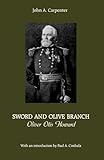Sword and Olive Branch : Oliver Otis Howard / John Carpenter.
Material type: TextSeries: The North's Civil WarPublisher: New York, NY : Fordham University Press, [2021]Copyright date: ©1999Description: 1 online resource (379 p.)Content type:
TextSeries: The North's Civil WarPublisher: New York, NY : Fordham University Press, [2021]Copyright date: ©1999Description: 1 online resource (379 p.)Content type: - 9780823219889
- 9780823296705
- online - DeGruyter
| Item type | Current library | Call number | URL | Status | Notes | Barcode | |
|---|---|---|---|---|---|---|---|
 eBook
eBook
|
Biblioteca "Angelicum" Pont. Univ. S.Tommaso d'Aquino Nuvola online | online - DeGruyter (Browse shelf(Opens below)) | Online access | Not for loan (Accesso limitato) | Accesso per gli utenti autorizzati / Access for authorized users | (dgr)9780823296705 |
Frontmatter -- Contents -- Illustrations -- Introduction to the 1999 Edition -- Preface -- Early Life -- Prewar Service in the Regular Army -- Brigade Command -- Division and Corps Command -- Chancellorsville and Gettysburg -- Western Victories -- The End of the War -- Early Months of the Freedmen's Bureau -- Relief Work and Land Policy -- Labor and Legal Matters -- The Controversial Bureau -- Education -- Howard University -- Bureau-related Activities: the Barry Farm and the Freedmen's Bank -- Church Dispute and House Investigation -- Peace with the Apaches -- Bunoty Paying, Court of Inquiry -- Washington., D. C. -- Service in the Northwest -- Final Army Assignments -- The Closing Years -- Notes -- Bibliography -- Index
restricted access online access with authorization star
http://purl.org/coar/access_right/c_16ec
Oliver Otis Howard devoted his life to the service of his country, both as a distinguished army officer in two wars and as the founder of two universities. Oliver Otis Howard was a graduate of Bowdoin College and of West Point. Being reared in a pious New England (Maine) atmosphere gave him a deep sense of obligation to lead a Christian life, for the good of others and for the development of his own best self. He was often disturbed by the conflict presented him in his dual career in peace and war.General Howard’s strong sense of duty to his country brought about his distinguished career of command during the Civil War—at the Battle of Chancellorsville, itself a disappointing rout, and at Gettysburg, where he recovered any reputation the earlier defeat might have lost him. Under General Sherman, in the Atlanta campaign, and as a leader of the Army of the Tennessee he won special distinction. In total, Howard fought at the First Bull Run, Fair Oaks (where severe wounds forced the amputation of his right arm), Second Bull Run, Fredericksburg, Chancellorsville, and Gettysburg.The same strong sense of duty made him accept the commission of the Freedmen’s Bureau and the promotion of African–American education. Following his service in the Nez Perce Campaign of 1877 he was superintendent of West Point and the founder of Lincoln Memorial University. His greatest service to education, however, was as founder and president of Howard University, where his name and career are held in honor.
Mode of access: Internet via World Wide Web.
In English.
Description based on online resource; title from PDF title page (publisher's Web site, viewed 03. Jan 2023)


